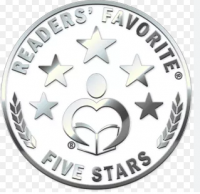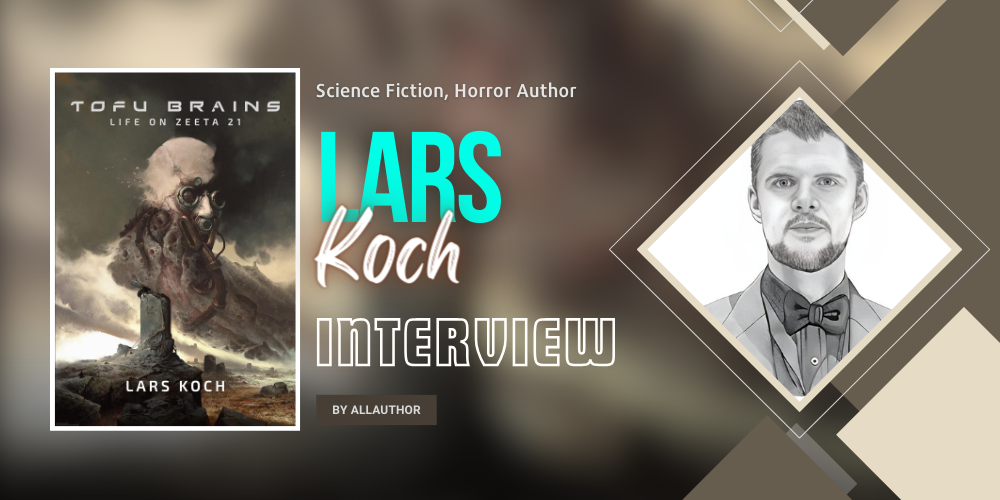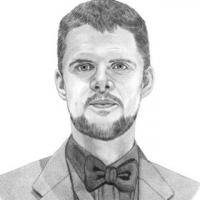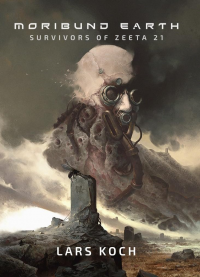How has your Danish heritage and upbringing in Haderslev influenced your writing?
I grew up mostly inspired by English books and authors. I huge epiphany for me was reading the Dragonlance series by Weiss/Hickman around 12 years old. I remember thinking 'I can also do this, I can capture these emotions'. Later in life I also discovered Kirkegaard. Outside books, I was definitely inspired by the dogme movement and film makers like Von Trier and Thomas Vinterberg.
Can you share a specific moment or memory when you realized that you wanted to pursue writing as a career?
2005-2006. I remember it vividly because I was about to leave Denmark and go to Bavaria for an internship. This was just after finishing school, so I wrote a bunch of ideas and concepts down as I was travelling. Most of the ideas got revamped, and the overall tone of the book definitely ended up much darker and morose compared to the more goofy style of the initial draft.
Given your background in filmmaking with two short films under your belt, how does your experience in directing inform your approach to storytelling in literature?
To me, there are important overlaps between directing a movie and writing a book. In both cases, you want to tell a story. One that moves you, ergo can also move other people. And when you think about it, a book also needs character motivation, a structure etc. What I enjoy most in both scenarios, is the planning and constant reiteration that both goes into editing a film and writing a book. It’s two very different types of medium, that you should use to the greatest effect.
You mentioned practicing Transcendental Meditation since 2019. How has meditation influenced your creative process, and do you find any connections between mindfulness and the themes in your writing?
Meditation, or any kind of spiritual/mindful work, is a huge boost to any creative endeavor. You sometimes get ideas handed to you during mediation. Sometimes they pop up during the day. Write them all down! I very much refer to it in my writing. The Abbess talks about transcending pain via meditation. We see a clear difference between her and the more impulsive (and destructive) characters.
Can you share the inspiration behind your debut novel, "Tofu Brains," and how the Fallout universe and the works of Lars von Trier, Phillip K. Dick, David Lynch, Franz Kafka, Ayn Rand, and Akira Yamaoka influenced your writing?
Fallout, the video game, came out in 1997. I still remember going to the store and picking it up (11 years old). The dark, grim post-apocalyptic world juxtaposed with a 1950s carefree aesthetic and easy-going humor was just perfect. I credit my love for everything dystopian to that game. I even contacted two of the original creators and send them copies of the book! Kafka inspired me a lot in terms of introspective writing. I love how he develops characters which feel relatable. Ayn Rand...my gosh. I read Atlas Shrugged during a hiking trip to the Baltics (Lithuania, to be precise). I just love the humanity and her almost 'romantic view' of how humans should ideally work and behave. I coined the new name for the tyrannical Arand Corporation based off her.
"Tofu Brains" is a unique title. What led you to choose this name for your book, and does it hold a special significance within the story?
Ehm, good question. Actually, the title is the one thing I don’t like! I am actually planning a re-release of the book later this year, notably with a new title. Tofu Brains was the title I came up with in 2006 when I first started writing. It fit the whimsical tone I was going for. But the book turned into so much more, and it just doesn’t do the book justice anymore.
Especially considering that I am planning a trilogy of books.
Tofu Brains refer to an edible tofu-like paste, which is an actual food item made by Arand. This was initially meant to be a major plot point because the main character was a mute zombie. It thus explained how he could live/function normally in society and hold back his need to consume flesh (a not-so-subtle nod do how mental health issues are ignored in our society).
So yeah, that’s the background. Look forward to coming up with a new title!
How do you integrate your views on art into your writing, and do you see any parallels between your literary work and your short films on MonkWax.com?
My views on art... I gravitate towards art which is very introspective, reflective and personal. So more about the struggles of the individual, rather than looking at the collective. David Lynch's movies exemplifies that approach. My first film, Qued: Concatenatio, is inspired by that, coupled with the looks of 1920s silent films. The limited technology available at the time gave them a timeless look.
On writing, I am stronger with explaining and developing characters rather than environments. The latter is something I want to build upon.
"Tofu Brains" is your first novel. Can you share some challenges and highlights you experienced as a first-time author in the process of bringing your book to life?
The biggest constraint in writing a book is: freedom. You basically have an unlimited scope to write about anything you want.
People are surprised but I always say: constraints when creating is good. You need to build a structure, a framework if you will, and decide that you are going to tell a story within that framework/time-period/etc. And then map out as much as you can before starting your process: overall theme and setting, major plot points, major/minor characters etc.
If was thanks to have this structured approach I managed to finalize and release the book.
The world of "Tofu Brains" seems to be a blend of various genres. How did you go about creating a cohesive and immersive universe that draws inspiration from such diverse sources?
I feel the book represents me as a person: dark and morose at times, but also lighthearted and silly. I like how humor is maintained in such a dark setting. It is challenging to do, and not always appreciated for how difficult that actually is to pull off. Having and using real-life knowledge and just being inspired by other genres is always a good thing. It makes the product richer.
Are there any specific themes or messages you hope readers take away from "Tofu Brains?”
Ultimately, the book is about the fate of man and the fate of our world. Depicted in a very dark and grim way, but I hope people take away a positive message from the book. That essentially, there are virtues in the world, even in dark times, and that we can succeed as a collective by working together. The latter is something the characters in the book fail do to.
As an artist who admires the works of iconic figures like Lars von Trier and Franz Kafka, how do you navigate the balance between paying homage to your influences and creating something entirely unique in your writing?
For the re-release of the book, I might delete some of those references. I was not sure how best to tease/represent the book, so my thinking was doing it kind of meta; 'I like these artists and wrote a book. If you like them, you might also like my book!'. I plan on re-writing the back-cover text completely. Focus on the book, not my inspirations.
How does your visual storytelling influence your approach to crafting vivid and immersive literary landscapes in your novels?
Films and books are the polar opposites in that regard. In films, you are extremely limited in terms of what you can actually bring on screen in a believable way. Unless you're making a 200bn dollar Hollywood movie you must rely on simple things like good camera techniques, sharp editing and practical effects. In books, your budget is 'unlimited'. It costs nothing to add a spaceship or high-tech gun. As long as the reader can imagine it, you're good. Books then have another challenge of keeping the reader invested and bringing them along for the entire ride.
Considering the success of "Tofu Brains," do you feel any pressure or expectations as you work on the sequel, "Enantiodromia - The Pendleton Files"?
Yes and no. I know now that I can do it, that writing a book is possible. Also, the lore, the setting, characters all got well-established in the first book, so there is plenty to build upon. And, I have mapped out the story-line for Enantiodromia already, so its a good starting place. However, the challenge is still to scope and pace the book correctly. In some ways, it will depart from Life On Zeeta 21 in that it focuses on fewer characters. Also, I added a nice challenge for myself; it's a prequel, not a sequel (book 3 will be a sequel).
So, in some ways it feels like started all over, but with strong reference material to work with.
What advice would you give to aspiring writers, particularly those who may be drawn to combining diverse influences in their work?
I would say; Dont hold off, do it! With the right planning (Q12) is it definitely within reach to create something exciting. And there are just so many options today for independent writers such as Amazon, AllAuthor etc. I would like to create content, possibly via YouTube or Twitch, explaining the creative process. This could be highly engaging and allow networking within the community. Let’s see when/if that idea pans out.
What is your takeaway based on your experiences with AllAuthor? What is it about this site that you like and dislike?
AllAuthor are really skilled at running an interactive platform that allows material creating and sharing among peers. I recommended it to an author-friend of mine who immediately jumped in. I would like to understand abit better how I can use the platform to boost a book-launch, relevant both for Life On Zeeta 21 (re-launch) and Enantiodromia.





